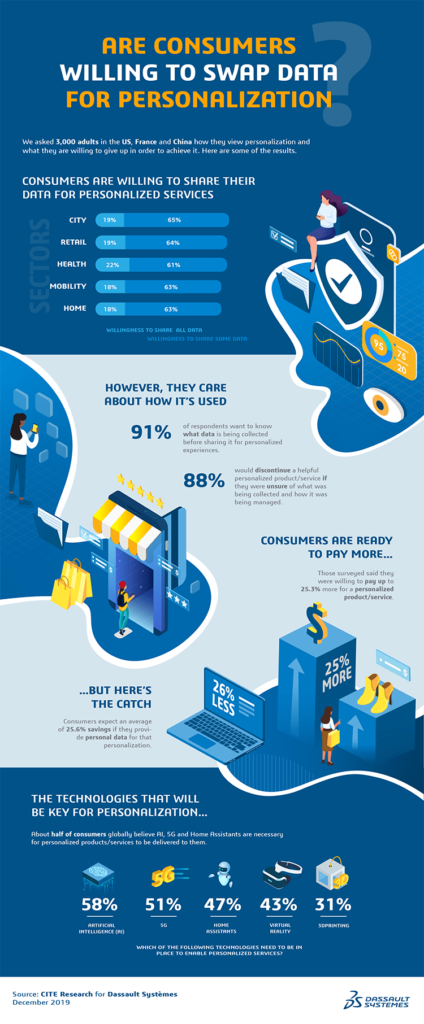- Survey of 3,000 consumers in the U.S., China and France examines views on personalization in healthcare, mobility, retail, and home and city environments
- Personalization in healthcare, prioritized over other categories, will require AI, 5G and home assistant technologies to achieve, according to respondents
- Consumers will pay on average 25.3% more for personalization, but they expect a savings in return
- Generation X, millennials, and Generation Z are more willing to pay and share data for personalization that brings personal safety, time, monetary benefits
VELIZY-VILLACOUBLAY, France — January 8, 2020 — Dassault Systèmes today revealed that younger consumers are leading the push for personalization that improves products and services, quality of life and personal safety, and are more willing to pay and share their data to get it. The findings came from a survey of citizens representing the demographics of adults in the U.S., China and France that was conducted in partnership with independent market research firm CITE Research.

The survey revealed differences among generations, geographies and technology adoption levels in terms of how consumers view personalization in mobility, healthcare, retail and the home and city environment, how they define personalization, and what they are willing to give up for it. Yet it also confirmed that nearly all consumers already value the importance of personalization, in particular for health and personal safety, and share concerns about how data is collected and managed to achieve it.
Findings from the survey include:
- Consumers want personalization but don’t want to wait for it. Eighty-three percent of consumers expect products or services to adapt in a matter of moments or hours. Only 21% will wait four or more days for a personalized product or service to be delivered.
- Consumers are willing to pay on average 25.3% for personalization. In return, they expect to be compensated with an average of 25.6% savings for giving out their data. They are more willing to pay for personalized healthcare; less so for personalized retail.
- Industry has an opportunity to clearly define personalization. Consumers have a mixed definition of personalization. More than 50% define it as products/services they customize before purchasing, and as products/services selected from a list of options, as well as products/services created based on personal data; 63% of early technology adopters define personalization as the latter.
- Consumers are most interested in personalized products and services that benefit health, such as personalized preventative health plans based on behavior, and alert systems for falls.
- Personalization for personal safety is also of interest to consumers, such as products that notify of time-sensitive home emergencies, crime alerts based on location, and sending their location to police during times of safety concerns.
- Data privacy is a concern for 96% of consumers. Most consumers will only share data they agreed to share in exchange for personalization, yet anonymizing data will make six out of 10 respondents more willing to share. Eighty-eight percent will discontinue a helpful personalized service if they are unsure of how their data is being managed. For 68%, consumer demands will lead to data protection.
- Artificial intelligence, 5G and home assistants are necessary for personalization. About half of consumers think that 5G, in particular, is very necessary for delivery of personalization in healthcare, while it is seen as less vital in retail.
- Personalization expectations differ among generations. Generation X, millennials and Generation Z are more comfortable sharing data for better personalization and are more likely to agree on the personal safety, time and monetary benefits it brings than baby boomers and the silent generation. Sixty percent of baby boomers are most excited about personalization in healthcare, 24% of Generation Z about mobility, and 21% of millennials about the environment.
- Chinese consumers are more enthusiastic about personalization than American and French consumers, but Americans have the highest expectations. More American consumers expect personalized products and services to be commonplace by 2030, and more are willing to pay for them.
“Consumers want experiences with personalization as the differentiator, especially among younger consumers. The solution for manufacturers to capitalize on this trend is to collect, analyze and transform data while addressing concerns for data privacy. Our 3DEXPERIENCE platform enables them to do just that. Using the platform, companies can innovate, design, create and manufacture hyper-personalized products in the most sustainable way,” said Florence Verzelen, Executive Vice President, Industry Solutions, Marketing and Global Affairs, Dassault Systèmes.
For more information, visit www.3ds.com.












